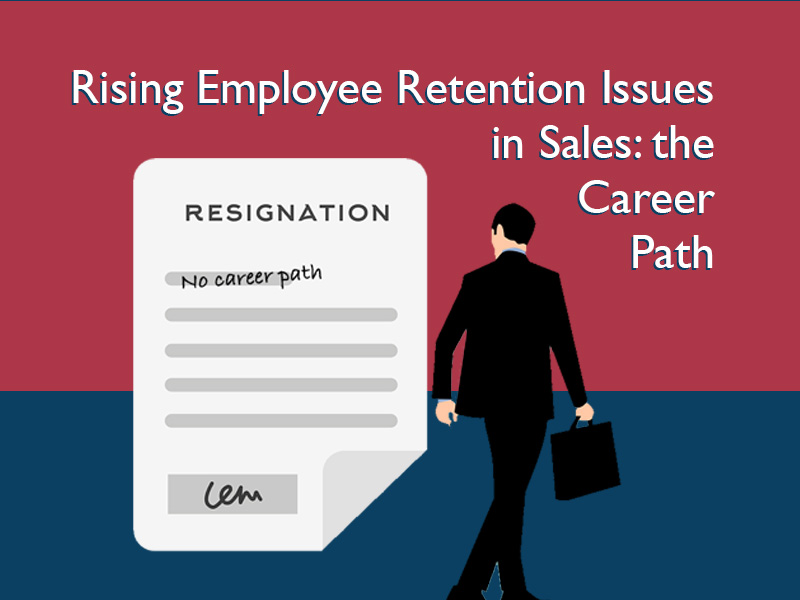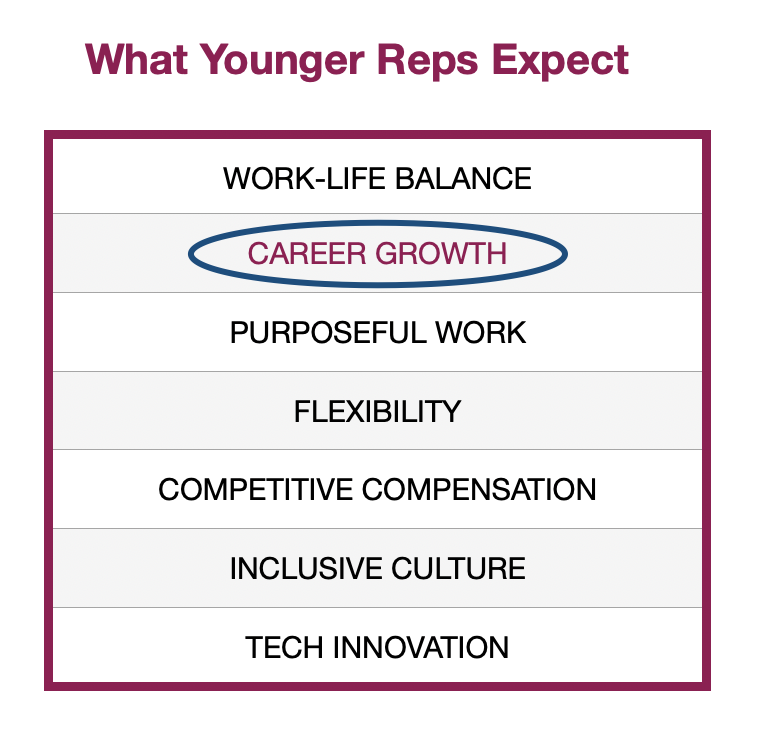
Let’s assume your sales reps are happy with your leadership and they have a reasonable work/life balance. What’s the most likely next source of employee retention issues?
Research shows that not far down the list of reasons for voluntary resignations comes “few growth/advancements opportunities” – at just under a third of interviewees. Those taking part included both US workers and US employers across 57 industries.
But we’re talking sales here. And retention in sales was something you didn’t have to worry about 20 years ago.
What’s changed? Talent expectations. Millennials and Gen Z, in particular, expect a clear career path as part of their job package. They want both purposeful work and career growth.
An agreed and well-facilitated career path can therefore be the deciding factor in whether employee retention becomes another headache you have to deal with.
So – let’s look at
- the cost of poor employee retention
- the kind of career path you can map out at interview and onboarding, and
- what resources and training you need to plan for during their career.
What Does Poor Employee Retention Cost You in Sales?
1 High turnover rates affect the performance of all your sales reps. It disrupts both the relationships in your team and the valuable ones you’ve forged with customers.
2 In sales, you cannot afford to lose knowledge, insight, and expertise around clients, market trends, and effective sales strategies. You’ll miss targets.
3 Clients who have to regularly deal with new reps lose trust in you and your brand. You’re leaching the consistency and continuity needed for longer-term success.
4 You have the extra costs of finding, recruiting, and hiring a replacement, during which time the rep who has left is not bringing in business.
5 Your training and onboarding costs escalate – due not only to training materials and time but also to decreased productivity (and performance metrics) while you get new reps up to speed and embedded in crucial teamwork.
6 You lose out on team cohesion and dynamics, which makes collaboration harder and team morale lower.
Overall? Staff churn is at 35% and rising, so it makes sense to address employee retention now and plan a good, fulfilling career path for your reps.
At 360 Consulting, our experience is that your people are a vital part of your sales “infrastructure” – but they can’t work to their best in a broken system. Recruiting and onboarding processes need to be tuned up with a sound career path mapped within your employee retention strategy.
So let’s look at what a good career path for them might look like.
Recommended Career Path for Employee Retention
Onboarding and Orientation
Assuming your recruiting process is sound, and you’ve outlined an intended career path you’ll help them move along, you need to onboard your new reps mindfully.
This means introducing them to your company culture. In broad terms, this not only includes your aspirations but the actual evidence! Show them around. Let them meet your team and ask questions. They need to meet with a non-toxic sales culture!
This is also when you prove your promise and offer basic sales training (or higher level if for higher positions) and ensure they gain full product or service knowledge. Understanding the value of what you offer your clients is essential to them feeling this is going to be purposeful work they wish to be part of.
Junior Sales Representative
For newcomers, you assure them they will focus on smaller accounts they’re able to achieve success with so they can progress as soon as possible.
You also give them regular feedback and coaching sessions in addition to accessing any workshops they can use to add skills to their armory. Assure them this is how they move eventually to larger accounts and that you’re supporting them to make the upward move.
Sales Rep
As soon as possible, let them handle larger accounts. For this, you’ll need to provide them with perhaps more specialized training such as advanced negotiation skills and selling techniques.
This should all be in your sales playbook, but as you support them to grow their skills, they’ll realize you’re progressing their career in incremental steps, as promised at interview.
Senior Sales Rep
You gradually offer some team leadership roles and the opportunity to mentor junior reps. If you can involve them in strategy and planning for your team, you give them the opportunity to prove their worth and feel part of your business in a new way.
Higher levels follow in your company after these stages. But the key here is that the career path was explicitly mapped out in essence at interview and facilitated. Otherwise employee retention in sales becomes an issue in a way it wasn’t in earlier days when we had one job for life!
 Resources and Training Ideas to Help with Your Employee Recruitment and Retention Plan
Resources and Training Ideas to Help with Your Employee Recruitment and Retention Plan
If you offer the well-thought-out career path that younger reps are looking for to avoid them walking, you will also need to consider the resources involved in making that a reality for them.
Here are some tips to help with that.
1 Mentorship Programs: If you pair younger reps with experienced mentors, you accelerate their learning and provide them with valuable networking opportunities. Two birds with one stone for you – and improved career prospects for them!
2 Online Courses: Utilize platforms like LinkedIn Learning, Coursera, or Udemy for specialized sales training. Give them time to complete these, and discuss their learning afterwards – applying it to your own brand and sales strategy.
3 In-House Workshops: Organize regular training sessions led by internal or external experts to bring a wealth of extra specialism into your team. This engenders collaborative working that
- benefits the development of the whole team and
- helps your younger reps believe there’s a future with you.
4 Sales Tools Training: Be sure to offer regular comprehensive training sessions on CRM software, data analytics tools, and other sales enablement technologies. There’s always something new to learn or develop that will help them in another aspect of their sales work.
5 Soft Skills Training: As an emotionally intelligent leader, be sure to encourage soft skills via workshops on communication, emotional intelligence, and conflict resolution. It contributes to the sales culture younger reps prefer.
6 Gamified Learning: Younger reps may respond well to gamification to make their training more interactive and engaging. Try it!
7 Feedback Mechanisms: Set aside time for positive and balanced feedback: regular performance reviews, 360-degree feedback, and customer feedback analysis.
360 Consulting Can Help with a Sales Career Path Strategy
Although providing these resources comes with a cost, this pales in comparison to the cost of failing in sales employee retention. At 360 Consulting, we have years of experience working with many businesses to strengthen their sales infrastructure. Schedule a free consultation today about employee retention!

 Resources and Training Ideas to Help with Your Employee Recruitment and Retention Plan
Resources and Training Ideas to Help with Your Employee Recruitment and Retention Plan